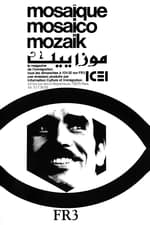Personal Info
Known For Writing
Known Credits 5
Gender Male
Birthday January 1, 1944
Day of Death November 23, 2023 (79 years old)
Place of Birth Paris, Ile-de-France, France
Also Known As
- مولود ميمون
Content Score
100
Yes! Looking good!
Login to report an issue
Biography
Mouloud Mimoun is a journalist, editor-in-chief, director. He was one of the columnists and then the editor-in-chief between 1977 and 1987 of Mosaïque, France 3's pioneering program on immigration issues. In 2009, he created the Le Maghreb des Films association.
Mouloud Mimoun was born in France to an Algerian family that immigrated during the First World War. In 1954 his family returned to Algeria, Mouloud was 10 years old. From his childhood in Paris, his passion for the seventh art remained. Even before he was 10 years old, he frequented the now-defunct Artistic Voltaire room with his friends. The good student will then join the Normal School of Teachers in Algiers, where he notices how few Algerians are compared to the “Europeans”. Until then, he felt French: that is now impossible. Especially since, during the last year of the war, he saw his establishment burned by supporters of the OAS. An FLN official then asked him to help him as “organizing secretary”.
A few months later, he joined the press agency created by the first Algerian government. Aged just over 18, he is the youngest journalist at APS (Algérie Presse Service) where, responsible for covering youth and sports, he often rubs shoulders with the very young minister responsible for this area, Abdelaziz Bouteflika. He continued to frequent cinemas and began to write about cinema, notably in the daily El Moudjahid and the weekly Algérie-Actualité, becoming a pioneer of film criticism in his country. In 1965, it was quite natural that he joined the Algerian News Office, headed by filmmaker Mohamed Lakhdar-Hamina, of which he would become editor-in-chief. From now on, he will no longer leave the world of images, becoming one of the main animators of the Algiers cinema library, then at the height of its glory: it regularly receives the greatest filmmakers on the planet such as Jean-Luc Godard, Youssef Chahine , Glauber Rocha or Sembène Ousmane. “Paradoxically, a period of great freedom and excitement in terms of culture under Boumédiène, even though the single party reigned. »
Badly seen by the authorities, particularly for his union activities and his links with the PAGS, a rehash of the Communist Party, shaken by a lightning strike, he decided once again to cross the sea and became a buyer of foreign films for the Office of Algerian news, press officer for young filmmakers like Merzak Allouache or Mohamed Bouamari, and finally cinema columnist for Mosaïque since its creation by the director Tewfik Farès, a friend. When the show disappeared, Mimoun produced documentaries for Arte, wrote articles in the Algerian press, presented La Nuit Du Ramadan on France 2…
In 2009, with L'Humanité critic Gérard Vaugeois and a few cinema-mad friends, he noted the extent to which Maghreb films had almost disappeared from screens, in theaters and on television, on both sides of the Mediterranean. . Almost without means, he created with them the Maghreb Des Films (maghrebdesfilms.fr), where he moderates, of course, a good part of the debates which accompany the screenings. His life, at 70, is still cinema, cinemas.
He died in November 2023.
Mouloud Mimoun is a journalist, editor-in-chief, director. He was one of the columnists and then the editor-in-chief between 1977 and 1987 of Mosaïque, France 3's pioneering program on immigration issues. In 2009, he created the Le Maghreb des Films association.
Mouloud Mimoun was born in France to an Algerian family that immigrated during the First World War. In 1954 his family returned to Algeria, Mouloud was 10 years old. From his childhood in Paris, his passion for the seventh art remained. Even before he was 10 years old, he frequented the now-defunct Artistic Voltaire room with his friends. The good student will then join the Normal School of Teachers in Algiers, where he notices how few Algerians are compared to the “Europeans”. Until then, he felt French: that is now impossible. Especially since, during the last year of the war, he saw his establishment burned by supporters of the OAS. An FLN official then asked him to help him as “organizing secretary”.
A few months later, he joined the press agency created by the first Algerian government. Aged just over 18, he is the youngest journalist at APS (Algérie Presse Service) where, responsible for covering youth and sports, he often rubs shoulders with the very young minister responsible for this area, Abdelaziz Bouteflika. He continued to frequent cinemas and began to write about cinema, notably in the daily El Moudjahid and the weekly Algérie-Actualité, becoming a pioneer of film criticism in his country. In 1965, it was quite natural that he joined the Algerian News Office, headed by filmmaker Mohamed Lakhdar-Hamina, of which he would become editor-in-chief. From now on, he will no longer leave the world of images, becoming one of the main animators of the Algiers cinema library, then at the height of its glory: it regularly receives the greatest filmmakers on the planet such as Jean-Luc Godard, Youssef Chahine , Glauber Rocha or Sembène Ousmane. “Paradoxically, a period of great freedom and excitement in terms of culture under Boumédiène, even though the single party reigned. »
Badly seen by the authorities, particularly for his union activities and his links with the PAGS, a rehash of the Communist Party, shaken by a lightning strike, he decided once again to cross the sea and became a buyer of foreign films for the Office of Algerian news, press officer for young filmmakers like Merzak Allouache or Mohamed Bouamari, and finally cinema columnist for Mosaïque since its creation by the director Tewfik Farès, a friend. When the show disappeared, Mimoun produced documentaries for Arte, wrote articles in the Algerian press, presented La Nuit Du Ramadan on France 2…
In 2009, with L'Humanité critic Gérard Vaugeois and a few cinema-mad friends, he noted the extent to which Maghreb films had almost disappeared from screens, in theaters and on television, on both sides of the Mediterranean. . Almost without means, he created with them the Maghreb Des Films (maghrebdesfilms.fr), where he moderates, of course, a good part of the debates which accompany the screenings. His life, at 70, is still cinema, cinemas.
He died in November 2023.
Writing
|
|||
|
|||
|
Acting
|
|||
|
Production
|



